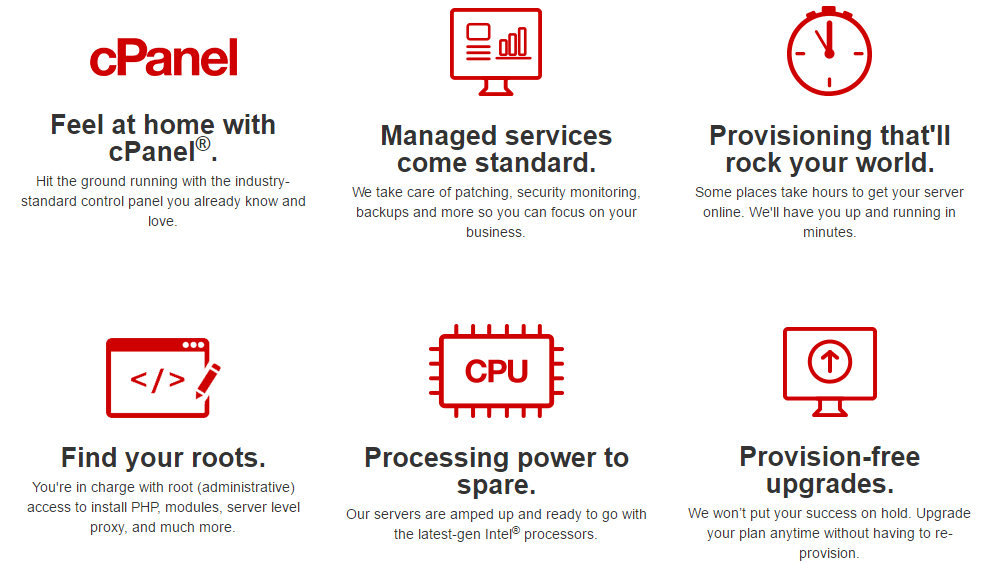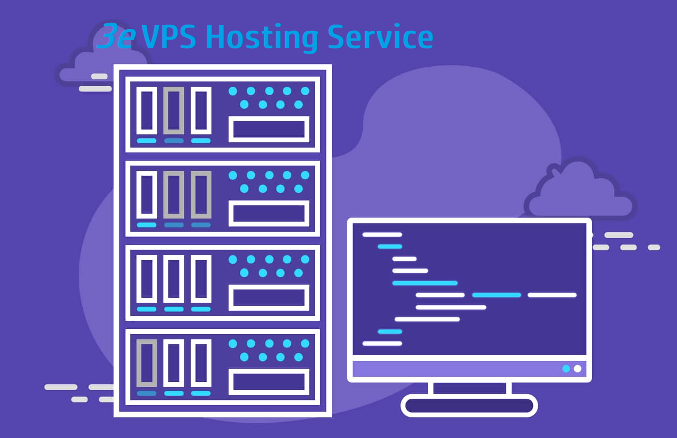
Self Managed:
You don’t need anyone’s help — you’ve got this covered. When standing up new environments, you’d rather control your updates, if you make any at all. Our Self-Managed plans give you the freedom to flex your tech skills.
Managed
You just need simple backups and patching, updates you don’t have to think about and the power of cPanel. We include it all at no additional cost, giving you the tools to handle everything else.
Fully Managed
You don’t have the time to be a SysAdmin. Our dedicated Advanced Hosting Support team can do that job for you, so you can focus on your clients.
Host server:
- Processor type 2x Intel E5-2630L v2
- Processor memory 128GB ECC DDR3 1600MHz (8 x 16)
- Processor cache 15MB
- Hard disk 6x300GB 10k (slot 0,1,2,3,4,5)
When should I Move to VPS hosting?
A VPS is a private virtual server that exists on a much more powerful physical machine. But unlike shared hosting, you have a guaranteed allotment of system resources that only you have access to. So, even if there is a much bigger website than yours on another VPS, hosted on the same physical machine, that won’t matter: you’re always guaranteed the system resources that you’re paying for. Think of it like one big computer, running lots of little computers inside of it. This means that provided you don’t overload your VPS, your website will perform much better. Plus, once your website grows, you can easily upgrade your VPS to a more powerful one in a matter of minutes – no migration required.
A Virtual Private Server allows you to host sites (storefront, e-commerce, content, media) and software applications (primarily web: portal, extranet, collaborative solutions, wiki, CRM) with ease.Unlike shared hosting, VPS hosting makes it possible to isolate multiple applications from one another within the same container. While this VPS container shares physical resources (infrastructure) with other containers, its resources are dedicated to you.
If you’re outgrowing your shared web hosting or simply want more control, a managed or fully managed Virtual Private Server (VPS) is the next logical choice for your hosting needs. It gives you more freedom with root access to Apache and PHP, plus you can install an SSL certificate, as well as any type of software – all without the responsibility of a dedicated server. In a shared server, you rely on the performance of the platform provided. By choosing VPS, you get to select a configuration best suited for your applications, requirements and growth.
Here are some specific needs which will require a VPS or Dedicated Server.
Office emails – If you have multiple email users working from the same office (same connection IP address), then you will want a VPS. The reason is that shared and reseller plans limit POP and IMAP connections to 30 per hour per connecting IP.
- Mass emailing – If you advertise through email or have a large contact mailing list, you will want a VPS. The reason is that shared and reseller plans limit each domain name to sending 500 emails per hour.
- Custom installations – If you want to develop a custom hosting environment, or want to install something which is not compatible with our shared servers, then you will want a VPS. The reason is that shared and reseller plans do not allow you to change the included server hardware and software; we must provide a stable and consistent environment for every one on a shared server, and allowing changes will inevitably affect the other users.
You may also want to use Linux VPS Hosting if you have Expansion of your business beyond shared hosting level, Expectation for a significant increase in traffic over the next few months, Plans to work with confidential secured data in your business, Intention to increase headcount which in turn requires a greater email capacity, or you want to plan to host multiple sites, blogs or different applications very soon.
Performance
Easy admin/unlimited accounts
Root access
Monitoring and alerts
Backups and recovery console
Global data centers
Scalability
Security
Frequently asked questions (FAQ) about VPS Hosting.
What is the difference between managed vs. unmanaged (Self Managed) VPS? And how do I determine which is best for me?
Unmanaged VPS (also known as “Self-Managed VPS”) tends to require an advanced degree of technical know-how and basic understanding of Linux and the command line. Unmanaged VPS hosting plans allows you to configure and update VPS hosting to your exact preference.
But, if you prefer to have an expert manage your hosting and the tech stuff (freeing up more time for you to focus on your business), then Fully-Managed VPS Hosting might be the right choice to fulfill your hosting needs.
Which operating system can I run on my server?
GoDaddy VPS Hosting offers both Linux (CentOS 7 or Ubuntu) and Windows 2016.
Do you provide Windows VPS hosting?
Yes! We offer Windows VPS hosting (Windows 2016) with resources staring at 2 GB RAM up to 32 GB RAM. Plus, you may add Plesk Obsidian Webhost Edition (for WordPress and website administration) to create and manage your sites.
How many IPs are included with VPS hosting?
3e VPS includes one free dedicated IP address. In the past, multiple IP addresses were needed for things like SSL and SEO. However, now with emerging technology, 1 dedicated IP works for:
- Multiple SSL certificates.
Your server supports Server Name Indication (SNI), which means you no longer need a dedicated IP address for each SSL certificate on the server. - Search engine optimization (SEO).
As long as each site has its own directory, a single IP address does not negatively impact SEO on the websites hosted on your server. - Site previews.
Your customers can preview their websites using the same IP address as long as you’ve correctly configured cPanel or Plesk.
Where are the servers located?
GoDaddy servers are located around the globe. Choose your server location during setup in North America, Europe or Asia-Pacific.
What is PCI compliance?
The Payment Card Industry Data Security Standards (PCI-DSS or PCI for short) designates security standards to protect cardholders’ credit card data. That means, entities that store, process or transmit credit card information are expected to be compliant to the standards in the Payment Card Industry Data Security Standards.
How can I accept credit cards online?
Our hosting services are a great place to setup your online presence and product catalog. You can then work with a third-party provider to process payments on your behalf to keep credit cards off your server. Whichever path you choose, make sure to be informed of additional requirements to keep your business PCI compliant.
What are the additional requirements I should know about?
We recommend you work with your payment provider (e.g., PayPal Checkout, Square Online Checkout and Stripe Checkout) to understand any additional requirements for which you are responsible.
Does VPS require a lot of technical knowledge?
Yes, VPS hosting is best suited for web developers and system administrators that have the technical knowledge to manage a server. VPS offers more power and flexibility than standard shared hosting, and with it comes more server management complexity.
Why should I choose VPS hosting from 3ewebhosting ?
If you’re looking for credibility and stability in your VPS hosting provider, know that we’re the world’s #1 hosting provider. That means millions of people trust their sites and applications to 3e web hosting. We offer high-performance KVM VPS hosting with flexible configurations for every budget, including automated weekly backups with scheduling and on-demand, monitoring, alert tools and expert support.
You also get to choose from Linux or Windows operating systems with optional control panels (cPanel/WHM or Plesk Obsidian Webhost Edition). And for those that don’t have the time or skill set to manage their server, we offer Fully Managed VPS hosting or one-time paid task-based services.
Are backups included in VPS hosting plans?
Yes. All VPS hosting includes automated weekly snapshots so you can schedule backup time – or create a backup on demand.
What are the real advantages of using VPS hosting?
VPS hosting gives you high performance with an isolated environment where the CPU, RAM and storage is 100% dedicated and not shared with any other websites or apps. That, compared to shared hosting, results in higher performance and security along with more flexibility and control over the server.
VPS hosting also offers higher resources and bandwidth/traffic than shared hosting, which means faster load times and unlimited traffic. A VPS allows the admin more control over security hardening and is less vulnerable to hackers in comparison to shared hosting. With shared hosting, if a site gets hacked there’s a greater chance that other websites on the server will also be compromised. Conversely, due to virtual isolation, a hacked VPS on the same hardware, won’t affect surrounding VPS environments.
And with root access, there are no restrictions on the applications you install; you can access and edit the system files, settings and server logons.
How long does it take to provision my server?
Although the average time for us to provision your account will likely be mere minutes, it may take up to 24 hours or more. But, if you need your hosting right away, please call us and we’ll do our best to speed things up.


